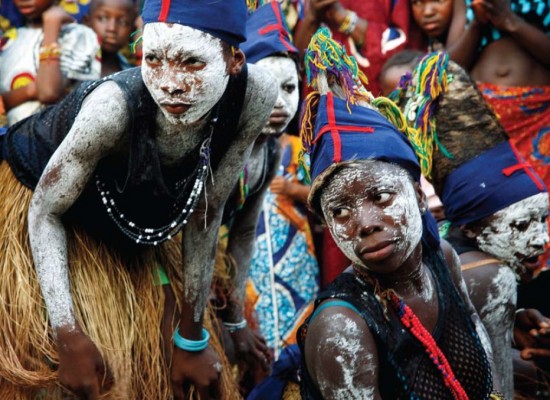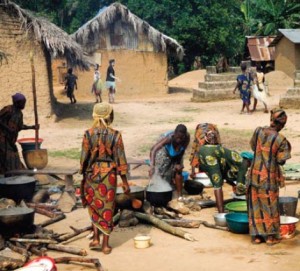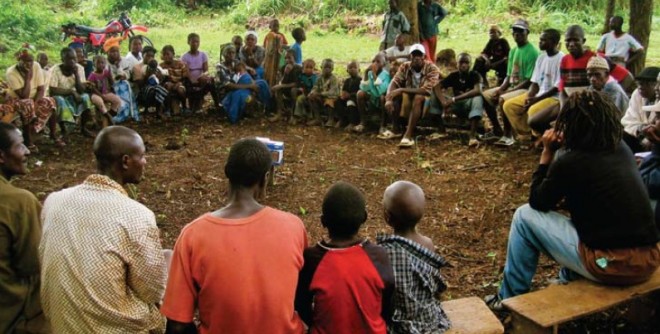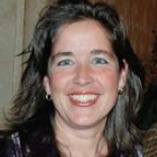
On a warm late-March evening, two young Sierra Leonean men gathered at a village bonfire, surrounded by family members, elders, and neighbors. Once close friends, Sahr and Nyumah had been torn apart while in their teens by Sierra Leone’s 11-year civil war. One boy was forced by rebel soldiers to brutally beat and maim his friend. The two came face to face that night. One man testified about his suffering; the other admitted his guilt and begged for forgiveness – which, in an astonishing act of grace, was freely given. The village sang and danced in celebration.
Sahr and Nyumah are not alone. Part of a groundbreaking new national initiative called Fambul Tok (Krio for Family Talk), similar acts of truth-telling and reconciliation are taking place between victims and offenders in villages across Sierra Leone.
Sahr and Nyumah’s experience – and the experiences of others like them – illustrates the ways in which “thinking small” may be the key to acting big. That is, working at the smallest possible level – the individual and the social unit closest to the individual, the village – may be the key to building a sustainable national peace in war-devastated nations in Africa.
Launch of Fambul Tok
The foundation I head, Catalyst for Peace, aims to forward peacebuilding by helping conflict-ridden areas draw on their local resources and culture to build peace. We are partnering with Forum of Conscience, a Sierra Leonean NGO headed by John Caulker, in designing and implementing Fambul Tok. Caulker, who fled his home and lost his mother during the war in Sierra Leone, spent well over a decade as a courageous voice for human rights during the war years. He has been a committed activist in the rebuilding process, giving voice to those who suffered most during the war.
When I first met Caulker last summer, he was at a point of utter frustration with the postwar reconstruction in his country. Having lobbied earlier for the creation of the Truth and Reconciliation Commission in Sierra Leone, he was disappointed with how little actual reconciliation it accomplished in the end. He felt the Commission had largely conducted its work in the country’s political centers, and used processes that made it difficult for many Sierra Leoneans to participate.
He also questioned the impact of the UN-backed Special Court in Sierra Leone, which has spent more than $300 million to try the nine men held most responsible for the war. “The people of my country live on less than a dollar a day, yet hundreds of millions are being spent on trials that will not make any difference at all to the average person,” said Caulker.
In an effort to help heal the lives of the average person, Caulker and I began to work together to shape his vision for a community-based reconciliation process, which evolved into the program now known as Fambul Tok. The heart of the Fambul Tok process involves community members gathering around a bonfire and talking, as they did long ago. Victims and offenders have the opportunity to come forward and tell their stories. They can ask for forgiveness or offer forgiveness, as they choose.
The next day a “cleansing ceremony” – often involving appeasing the ancestors – is held at a site that holds special, often sacred, significance for the locals, such as a particular rock, tree, or dwelling. Often a fowl or goat is killed during this ceremony. Almost all communities in Sierra Leone have such commonly recognized places and rituals, yet the process of using them was also a casualty of the war.
Finally, the community designates a “peace tree” surrounded by a seating area to serve as a permanent meeting place to resolve conflicts using the principles of Fambul Tok. It also serves as the site of a radio “listening club.” Battery-operated radios are provided for people to listen together to a half-hour weekly broadcast of locally recorded Fambul Tok stories. The Fambul Tok theme song, played on the radio broadcast, is already sung through much of Sierra Leone.
Some communities have gone on to develop other joint projects, such as community farms where everyone pitches in, or soccer events for the children.

Emergent Design
The rapid development of Fambul Tok (work only began on the ground in December of 2007) is due to several factors, one of which is the unique partnership Catalyst for Peace and Forum of Conscience have forged. In our early conversations, Caulker and I realized that implementing his vision of community-based reconciliation in Sierra Leone would likely require a robust collaboration – an unusual relationship between a “funder” and a “recipient” in peacebuilding.
I myself was a peacebuilding practitioner for 15 years before making a transition to the funding side in 2003 as the founder and president of Catalyst for Peace. I didn’t want to step away from direct involvement in the practice side. I recognized that, with Fambul Tok, actively bringing my peacebuilding sensibilities and grounding in the field could contribute to Caulker’s skills, while tapping into his established credibility and network of relationships. It could lead to a nationally transformative process.
At Catalyst we don’t simply read grant proposals, issue funds, and read the reports sent back by those we fund. We participate in project design and implementation, go into the field ourselves, and bring in expertise from other individuals or organizations when useful, in response to needs that emerge on the ground. This kind of close collaboration on Fambul Tok has allowed us to respond quickly to local realities and to work together to finetune our practices.
I call our design process “emergent design,” in that we build upon core elements, objectives and operating principles, but we leave room for flexibility and creativity in implementing them. Those of us from outside of Sierra Leone feel it is important not to arrive in the country with a preconceived program for a local entity to implement on our behalf. This is also the spirit the implementers on the ground in Sierra Leone embrace – it’s not their program, but rather it belongs to the people of Sierra Leone. The results from local ownership are inspiring.
Sahr, Nyumah, Reconcile
In the case of Sahr and Nyumah, both stood before the village bonfire in Gbekedu as the first step in their healing journey. The boyhood friends were barely teenagers when the rebel Revolutionary United Front invaded their village near the Liberian border. Sahr spoke of how the rebels ordered him to kill his father and of how he refused repeatedly.
As a result, Nyumah, also taken by the rebels, was ordered under threat of death to beat his friend. He complied, beating Sahr so severely that even today Sahr’s body remains misshapen – he is able to walk only with great difficulty, supported by a cane.
Living since the end of the war in villages just a mile or so apart, the former friends had not spoken about these events until the evening last March around the bonfire. Acknowledging what he had done, Nyumah asked Sahr for forgiveness, while bowing in a gesture of humility and apology. Sahr immediately gave his forgiveness. Villagers broke into song and dance around the bonfire as the young men hugged.
The next day, upon learning that Sahr’s father had also been killed that day in the bush, our documentary filmmaker, Sara Terry, gently queried Nyumah about what had happened to Sahr’s father, asking the question lingering in everyone’s mind: Had Nyumah killed him? Misery was etched on Nyumah’s face. Terry recalls:
…the young man said, very softly, yes. I was watching Sahr; he didn’t flinch at the news, didn’t move away from his friend. In a few minutes, I turned to Sahr and asked him how he felt. He was very direct and simple in his reply: “I forgive him everything.” Nyumah swooped into a bow at his friend’s feet. “I want this forgiveness to last forever and ever,” Sahr added. And then they started to shake hands – the handshake turned into an embrace. The two started walking back up the path into the village – Nyumah in front of Sahr, who was struggling a bit as he walked behind. Nyumah turned back. They put their arms around each other and walked back into the village together.
To see film clip on Fambul Tok, visit www.catalystforpeace.org.

Eager To Heal Wounds
Sahr and Nyumah’s experience exemplifies a broader national consensus around a desire and readiness for reconciliation. “Yes, we are ready” was the overwhelming response we received in every district during the national consultation process that launched the Fambul Tok program, an eagerness that far exceeded our expectations. Representatives at every consultation acknowledged the unhealed wounds of war, as well as the difficult realities of having perpetrators and victims living side by side. It was also clear the communities had local cultural traditions and practices of reconciliation, dormant since the war, that they were eager to awaken and use for social healing. As a rule, these practices were geared toward reintegrating perpetrators into the community, rather than alienating them through punishment or retribution.
Perhaps most remarkable, the towns that participated in the pilot phase of Fambul Tok this spring and summer viewed the program as being theirs, rather than being imported (or imposed) from the outside. With local leadership and design, no two ceremonies have been alike, nor will they be. They have common elements, though, including a snowballing effect whereby the first set of encounters between offenders and victims – characterized by confession, contrition, and forgiveness – are usually followed by many more in the group.
Though the recipe for Fambul Tok depends on the locals, Catalyst for Peace realizes that outsiders serve a valuable role, akin to yeast helping the dough rise. “We’re here to walk the participants though the process initially,” says Catalyst field program officer Robert Roche, MA ’08, who is based full time in Sierra Leone. “In a way, we validate the process. But once it gets going, they make it theirs.” (More about Roche in the sidebar “Outsider Suited to Fambul Tok.”)
The Fambul Tok program is expected to spread nationwide by the end of 2009, with ceremonies reaching every village over the next five years. This is an ambitious project, considering it may take Roche and the Sierra Leonean nationals he works with 10 to 20 hours to travel from their base in the capital city of Freetown to some outlying districts, often over routes that are basically bumpy footpaths.
Yet we believe everyone in Sierra Leone needs to engage in the healing process, wherever they are. The people of Sierra Leone are moving toward acknowledging and accepting what went wrong in their community and, by extension, their country. They are re-discovering their power, their goodness and their capacity to contribute to their society in helpful and healthy ways. They are finding a way to start anew, in the process helping their country do the same.
 [Elisabeth “Libby” Hoffman is president and founder of Catalyst for Peace, established in 2003 near Hoffman’s home in Maine. Libby holds an MALD from The Fletcher School of Law and Diplomacy at Tufts University and a BA in political science from Williams College. She attended the 1996 session of EMU’s Summer Peacebuilding Institute and completed an EMU course on conflict transformation taught by John Paul Lederach in 2000. She has been active in conflict resolution and peacebuilding for nearly 20 years as a professor, trainer, practitioner and funder. This article was adapted with permission from a longer article that appeared in the summer 2008 issue of The Fletcher Forum of World Affairs. The source article is posted at fletcher.tufts.edu/forum/archives/summer08.html.]
[Elisabeth “Libby” Hoffman is president and founder of Catalyst for Peace, established in 2003 near Hoffman’s home in Maine. Libby holds an MALD from The Fletcher School of Law and Diplomacy at Tufts University and a BA in political science from Williams College. She attended the 1996 session of EMU’s Summer Peacebuilding Institute and completed an EMU course on conflict transformation taught by John Paul Lederach in 2000. She has been active in conflict resolution and peacebuilding for nearly 20 years as a professor, trainer, practitioner and funder. This article was adapted with permission from a longer article that appeared in the summer 2008 issue of The Fletcher Forum of World Affairs. The source article is posted at fletcher.tufts.edu/forum/archives/summer08.html.]
